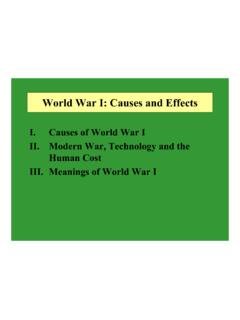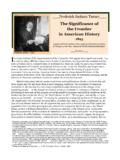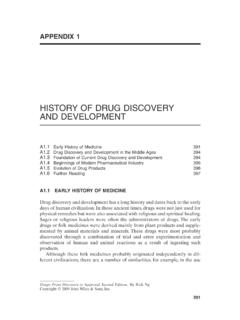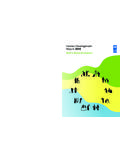Transcription of Civilization and Its Discontents
1 -1-Chrysoma Associates LimitedPublications Division - Electronic Books LibraryCivilization and Its DiscontentsBySIGMUND FREUD1929 Product Code: GSFX023 This electronic version is copyright 2000-2005. All Rights ReservedChrysoma Associates Ltd,12 Gainsborough Place, Aylesbury, Buckinghamshire HP19 8 SFEngland-2- Civilization and Its DiscontentsTHE impression forces itself upon one that men measure by false standards, that everyone seeks power,success, riches for himself and admires others who attain them, while undervaluing the truly precious thingsin life. And yet, in making any general judgment of this kind, one is in danger of forgetting the manifoldvariety of humanity and its mental life.
2 There are certain men from whom their contemporaries do notwithhold veneration, although their greatness rests on attributes and achievements which are completelyforeign to the aims and ideals of the multitude. One might well be inclined to suppose that after all it is onlya minority who appreciate these great men, while the majority cares nothing for them. But the discrepancybetween men s opinions and their behaviour is so wide and their desires so many-sided that things areprobably not so of these exceptional men calls himself my friend in his letters to me. I had sent him my little book whichtreats of religion as an illusion and he answered that he agreed entirely with my views on religion, but thathe was sorry I had not properly appreciated the ultimate source of religious sentiments.
3 This consists in apeculiar feeling, which never leaves him personally, which he finds shared by many others, and which hemay suppose millions more also experience. It is a feeling which he would like to call a sensation of eternity,a feeling as of something limitless, unbounded, something oceanic. It is, he says, a purely subjectiveexperience, not an article of belief; it implies no assurance of personal immortality, but it is the source of thereligious spirit and is taken hold of by the various Churches and religious systems, directed by them intodefinite channels, and also, no doubt, used up in them. One may rightly call oneself religious on the groundof this oceanic feeling alone, even though one reject all beliefs and all illusions.
4 These views, expressed bymy friend whom I so greatly honour and who himself once in poetry described the magic of illusion, putme in a difficult position. I cannot discover this oceanic feeling in myself. It is not easy to deal scientificallywith feelings. One may attempt to describe their physiological that is impossible I am afraid the oceanic feeling, too, will defy this kind of classification nothingremains but to turn to the ideational content which most readily associates itself with the feeling. If I haveunderstood my friend aright, he means the same thing as that consolation offered by an original andsomewhat unconventional writer to his hero, contemplating suicide: Out of this world we cannot fall.
5 1So it is a feeling of indissoluble connection, of belonging inseparably to the external world as a whole. Tome, personally, I may remark, this seems something more in the nature of an intellectual judgment, not. itis true, without any accompanying feeling-tone, but with one of a kind which characterizes other equallyfar-reaching reflections as well. I could not in my own person convince myself of the primary nature of sucha feeling. But I cannot on that account deny that it in fact occurs in other people. One can only wonderwhether it has been correctly interpreted and whether it is entitled to be acknowledged as the fans et origo2 of the whole need for Christian Grabbe, Hannibal: Ja, aus der Welt werden wir nicht fallen.
6 Wir sind einmal darin. 2 Source and have nothing to suggest which could effectively settle the solution of this problem. The idea that manshould receive intimation of his connection with the surrounding world by a direct feeling which aims fromthe outset at serving this purpose sounds so strange and is so incongruous with the structure of ourpsychology that one is justified in attempting a psycho-analytic, that is, genetic explanation of such a the following lines of thought present themselves. Normally there is nothing we are morecertain of than the feeling of our self, our own ego. It seems to us an independent unitary thing, sharplyoutlined against everything else.
7 That this is a deceptive appearance, and that on the contrary the egoextends inwards without any sharp delimitation, into an unconscious mental entity which we call the id andto which it forms a facade, was first discovered by psycho-analytic research, and the latter still has much totell us about the relations of the ego to the id. But towards the outer world, at any rate, the ego seems to keepitself clearly and sharply outlined and delimited. There is only one state of mind in which it fails to dothis an unusual state, it is true, but not one that can be judged as pathological. At its height, the state of-3-being in love threatens to obliterate the boundaries between ego and object.
8 Against all the evidence of hissenses, the man in love declares that he and his beloved are one, and is prepared to behave as if it were afact. A thing that can be temporarily effaced by a physiological function must also of course be liable todisturbance by morbid processes. From pathology we have come to know a large number of states in whichthe boundary line between ego and outer world become uncertain, or in which they are actually incorrectlyperceived cases in which parts of a man s own body, even component parts of his own mind, perceptions,thoughts, feelings, appear to him alien and not belonging to himself; other cases in which a man ascribesto the external world things that clearly originate in himself, and that ought to be acknowledged by the ego s cognizance of itself is subject to disturbance, and the boundaries between it and the outer worldare not reflection shows that the adult s sense of his own ego cannot have been the same from thebeginning.
9 It must have undergone a development, which naturally cannot be demonstrated, but whichadmits of reconstruction with a fair degree of probability. 3 When the infant at the breast receives stimuli,he cannot as yet distinguish whether they come from his ego or from the outer world. He learns it graduallyas the result of various exigencies. It must make the strongest impression on him that many sources ofexcitation, which later on he will recognize as his own bodily organs, can provide him at any time withsensations, whereas others become temporarily out of his reach amongst these what he wants most of all,his mother s breast and reappear only as a result of his cries for help.
10 Thus an object first presents itself tothe ego as something ex-isting outside, which is only induced to appear by a particular act. A further stimulusto the growth and formation of the ego, so that it becomes something more than a bundle of sensations, , recognizes an outside, the external world. is afforded by the frequent, unavoidable and manifold painsand unpleasant sensations which the pleasure-principle, still in unrestricted domination, bids it abolishor avoid. The tendency arises to dissociate from the ego everything which can give rise to pain, to cast it outand create a pure pleasure-ego, in contrast to a threatening outside, not-self.













